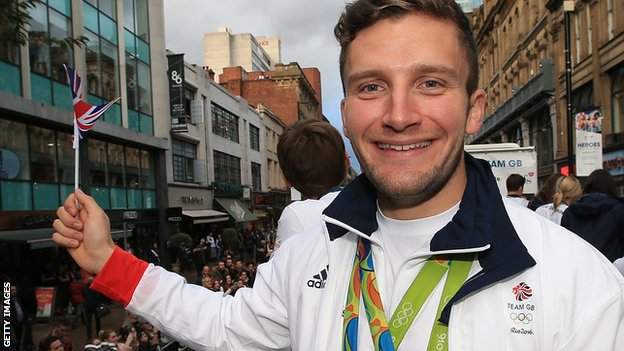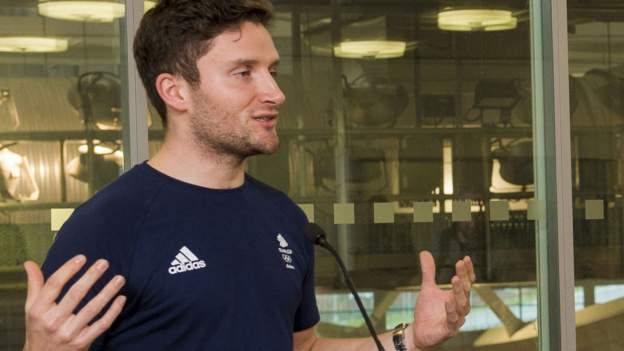
By Andy BurkeBBC Scotland
Last updated on .From the section Cycling

Olympic cycling champion Callum Skinner says Team GB sports risk having their funding withdrawn if they do not provide better care for their athletes.
Skinner believes too many are left poorly prepared for life after sport after dedicating their lives to it.
The 27-year-old Scot felt “discarded” by British Cycling when he stepped away from the sport last year.
“The governing bodies in the UK need to do a better job by the athletes,” Skinner told BBC Scotland.
“All of them have worth after sport. It’s just about trying to unlock that potential as best as possible.
“We are funded by public and private funds and, if we end up with too many casualties along the way, a lot of these public and private bodies will be questioning why they should be putting money into such a system.”
Skinner now fronts the Global Athlete movement that seeks to give a voice to athletes around the world and represent their interests to governing bodies.
“Even from a performance perspective, it’s in these organisations’ interests to try to transition their athletes out of the sport effectively to show they have societal worth afterwards in order that the money to push for medals can keep coming,” he said.
“It’s not only ethically the right thing to do, it’s the right thing to do for long-term sustained performance as well.”
Having won gold in the team sprint and silver in the individual sprint at the Rio Olympics in 2016 for Team GB, and a bronze for Scotland at the 2018 Gold Coast Commonwealth Games, Skinner announced his retirement from cycling last year.
“I felt pretty quickly discarded from British Cycling when I was open about my mental health issues,” he said.
“I didn’t really find a system that was compassionate or caring in that instance, which I find quite disappointing having been in that system for 10 years.
“Most of that time I was in good health and delivering winning results and winning performances. To then go in and ask for a three-month break and have that denied was quite tough.”
In May 2019, British Cycling launched a new mental health strategy which aimed to “shift the focus to a proactive approach of educating our coaches and support staff to allow for better understanding, toleration, containment and ultimately decreasing the prevalence and impact of challenging behaviours and mental distress.”
Skinner believes the British Olympic system generally has not adapted to the changing profile of its emerging athletes.
“The UK sport system is finding itself in a tricky phase of its evolution,” he said. “When the system first started in the ’90s, I think often you would be bringing in athletes who had gone to university or had a trade and were a little bit older.
“What we’ve seen recently is the average demographic of the athletes become far younger, arguably less educated, and as a result some of them end up really struggling when they come out of sport.
“Essentially all they can put on a CV about what they’ve done from the age of 14 to 25 or 28 or 32 is that they were a professional athlete. Some employers unfortunately find it quite hard to see the value in that.”
Skinner says particular focus and support should be given to those athletes who give many years to their sport but ultimately come up short in their ambitions.
